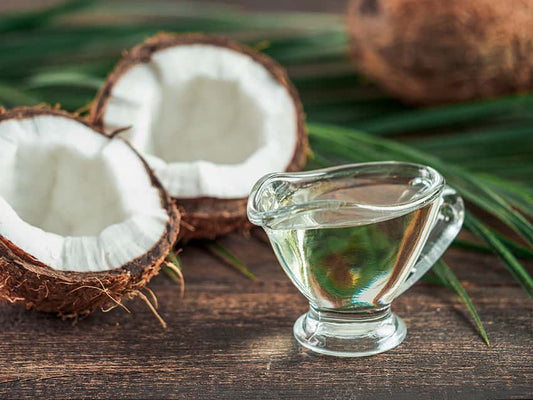MCT oil is among today's fastest growing supplements. This is partly due to the well-publicized benefits of coconut oil, but also thanks to the rise of low-carb or ketogenic diets, where fat comprises over 70% of the diet.
In addition, due to our increased understanding of fat not being the enemy, more people are looking towards bumping up their intake of healthier fats. These may include fats from flaxseed, avocados, olive oil, plant-based omega-3 fatty acids, and of course, MCTs from coconut oil.
The benefits of MCT oil on health and day-to-day performance are extensive. However, using MCT oil can be challenging.
MCT oil stomach ache problems, especially when taken on an empty stomach, can discourage some people from ever taking it again. But there's a better way.
This article will give you everything you need to know to use MCT oil most effectively and most comfortably. We'll give you tips on how to relieve stomach pain from MCT oil if you've taken too much. As well as insight on how to ease MCT's impact on the stomach.
We'll also fill in the details on what MCT oil is, what it does, and how you can use MCT oil for health. Let's get to it!
Key Takeaways
- MCT oil on empty stomach may be associated with gastric distress. In general it is not advisable to take MCT oil on an empty stomach unless you use a clean, top-shelf product.
- Coconut oil is usually discouraged as a dietary MCT source because it is far more likely to cause indigestion than oils that isolate the beneficial MCTs.
- Of the four MCTs (C6, C8, C10, C12) in coconut oil, C6 and C12 are most associated with stomach aches and digestive difficulties
- Premium MCT oil from organic coconuts that isolates C8 + C10 MCTs delivers the best of these healthy fats with the lowest risk of indigestion when taken on an empty stomach
- MCT digestive side effects may also be minimized by starting with a low dose and gradually ramping up, or by simply taking MCT oil with food.
Learn more about a high-quality MCT Oil product that is easy on the stomach
What Is MCT Oil?

Medium-chain triglycerides, commonly referred to as MCTs, are a fat extracted from either coconut oil or palm kernel oil.
It is a man-made product produced by a process called fractionation, which involves extracting and isolating MCTs from their source to concentrate a specific type of fat.
Within the realm of fatty acids, there are three types you should know about:
- Short-chain fatty acids—less than six carbons (uncommon)
- Medium-chain fatty acids—6-12 carbons: C6, C8, C10 and C12
- Long-chain fatty acids—13-21 carbons (most common)
Long-chain fatty acids comprise the bulk of fat intake, but medium-chain triglycerides can provide some healthy competition.
The MCTs that we commonly hear about are caproid acid (C6), caprylic acid (C8), capric acid (C10), and lauric acid (C12), with much of the positive effect of MCT oil coming from the C8 and C10 triglycerides, and few coming from lauric acid.
Pure MCT oil is usually 100% caprylic acid (C8), 100% capric acid (C10), or a mix of the two.
Can You Take MCT Oil On An Empty Stomach?
The quick answer to this question depends on your body, but for most people, it's a no.
If you've been taking MCT for a while, you may find you're okay to take it on an empty stomach. But if you're new to MCT, you may want to take things slow.
One of the most common side effects of taking too much MCT at once, especially on an empty stomach, is what's sometimes called "disaster pants," i.e. diarrhea.
But nausea, vomiting, stomach aches and other gastric upset symptoms are common, too.
Potential reasons for MCT digestive side effects may include:
- MCTs are absorbed and metabolized so quickly that they can overwhelm the digestive system.
- Straight MCTs on an empty stomach lacks food enzymes; this may register is an irritant to the stomach and trigger physiological mechanisms that flush the gut
- MCTs are saturated fats, which can be more difficult for some individuals to digest compared to other types of fats, especially in individuals with sensitive stomachs or digestive issues.
Help for MCT-related Stomach Aches

If you have taken coconut oil or MCT oil and now have a stomach ache, you can take some steps to help ease your gut.
Step 1: stop consuming the coconut oil or MCT product immediately and allow your digestive system to rest.
- Some other steps that can help settle your stomach include:
- Avoid fatty or greasy foods until symptoms subside.
- Drink plenty of water to help flush out the digestive system and aid in digestion.
- Small amounts of easily digestible foods, such as crackers or toast, may help settle the stomach.
- Peppermint tea or ginger tea can also provide soothing relief for gastrointestinal discomfort.
How long does stomach pain from MCT oil last? They vary in duration depending on individual tolerance levels and the amount consumed.
For some people, discomfort may subside within a few hours, while others may experience lingering symptoms for a day or more.
How to Improve MCT oil digestive comfort
To minimize the risk of stomach aches and indigestion when taking MCT oil, consider the following tips:
Start with a small dose: Begin with a low dose of MCT oil, such as one teaspoon (5 ml), and gradually increase the amount as tolerated. This allows your body to adjust to the higher fat intake and reduces the likelihood of digestive issues.
Choose quality MCT oil: Opt for high-quality, pure MCT oil without added ingredients or fillers. Some MCT oil products may contain additives that could exacerbate digestive issues.
Mix with food: Instead of taking MCT oil on an empty stomach, consider mixing it with food or beverages like smoothies, yogurt, or salad dressings. Consuming MCT oil with food can help slow down its absorption and reduce the risk of stomach aches.
Avoid C12 MCT products: C12 (lauric acid) is the medium-chain triglyceride that is most associated with gastric distress. It's naturally present in coconut oil, but also found in some MCT oil supplements. If you have diarrhea concerns, always check the label to be sure your MCT product does not contain C12.
Avoid low quality MCT oils: Cheap MCT oils may be sourced from GMO coconuts that are genetically modified with unknown gastric effects. Others may be hydrogenated, supplying trans fats that are unnatural to digest and unhealthy to boot.
Find a high quality MCT product and stick with it. Easy-on-the-stomach MCT oil will be C8+C10 MCTs only. No other fats, no other additives, no artificial flavors or sweeteners, highly purified, and ideally sourced from 100% organic coconuts. Learn more about the best MCT oils on the market
Note: Optimal dose of MCTs is two tablespoons per day, or 12.2 g total medium-chain triglycerides. For those with digestive sensitivities, it may take a little time to work up to the optimal MCT dose.
When you use MCT oil correctly, especially by taking a high-quality MCT oil product, you can enjoy all medium-chain triglyceride benefits without the digestive concerns.
Let's take a look at those benefits now.
Benefits of MCT Oil

Energy and Performance Fuel
Under normal circumstances, fatty acids are shuttled through the digestive system where they are broken down in the small intestine, absorbed, and transported.
MCTs, however, completely bypass the digestive system and are instead easily absorbed and transported directly to the liver, where they are quickly metabolized or converted into ketones.
Because they are digested faster than other foods, MCTs function primarily as an immediate source of fast usable energy to power the body's many processes.
Are you an athlete? Research suggests MCT energy may help to increase endurance.
In addition to serving as "fast fuel," MCTs may help with energy by optimizing cells' mitochondria powerplants.
Researchers suggest MCTs mitochondria benefits appear to improve exercise performance, specifically by enhancing endurance.(1)
Weight Loss Ketogenic Diet Support
MCTs are metabolized so efficiently that they cannot be stored as body fat.(2) They also minimally affect blood sugar. These are a couple of reasons why MCT oil is considered a healthy fat, especially for anyone who is trying to lose weight.
If you're considering taking MCT oil while following a keto diet or any other weight loss plan, you're on the right track.
In addition to the above points, medium-chain triglycerides (MCTs) can help diets in a few ways:
Rapid Energy Source: MCT energy is especially during the initial ketogenic diet phases when the body is still adapting to using ketones for fuel. It's also a great pre-workout for energized training, especially fasted training.
Appetite Control and Weight Management: MCT oil is linked to increased levels of peptide YY and decreased levels of ghrelin, two hormones involved in regulating appetite. This can have a positive effect on a ketogenic diet or any other regimen designed to help you lose weight. MCT may also affect the hunger-regulating hormone leptin.
Potential help for "keto fog": MCTs increase ketone production, helping to provide "alternative fuel" for the brain. Some research suggests that MCTs may have cognitive benefits, including improved memory and focus.
Want to shed a few pounds? MCT oil may accelerate the rate of fat loss.
Researchers have suggested that taking MCT oil as part of a weight loss regimen improves weight loss results when compared with olive oil. Researchers partially attributed this benefit to MCTs ability to increase energy expenditure (calorie burning).(3)
How to use MCT oil for weight loss: Take it to control appetite, substitute it for unhealthy fats in foods, and consider it as a pre-workout to boost endurance, improve fat burning and accelerate calorie burning.
Brain Health and Cognition
MCTs' pro-mitochondria effect and ability to raise ketones have been suggested to support brain health and sharp cognition.
The brain is an energy intensive organ. Each brain cell is densely clustered with mitochondria power plants. In optimizing mitochondria, MCT oil can help maintain overall brain energy, which is associated with both mental clarity and overall brain health.
Ketones, on the other hand, are a valuable fuel source for the brain. In human clinical studies, researchers have reported that ketones increase general cognitive function and sharpen alertness.(4)
Gut Health
Medium-chain triglycerides (MCTs) may positively impact the microbiome by exerting antimicrobial effects and providing prebiotic support, potentially fostering a healthier balance of gut bacteria and reducing. These effects can contribute to improved gut health and better synthesis and absorption of B-complex and other nutrients.
Coconut Oil vs. MCT Oil: Which is better?

MCT oil is often a derivative of coconut oil, but coconut and MCT are not the same thing.
Coconut oil comprises both medium-chain triglycerides, as well as long-chain triglycerides (LCTs), making it a much less effective energy source due to their different metabolic pathways in digestion and absorption.
Whereas MCT is shunted directly to the liver via the portal vein where they serve as "fast fuel" for mind-body performance, LCTs are absorbed slowly in the GI tract. They cannot serve as an immediate source of energy.(5)
And unlike MCTs, LCTs also require bile and pancreatic enzymes for digestion, along with carnitine for transport into mitochondria to be used for energy.(6)
The Coconut Oil Indigestion Issue
The other major difference between coconut oil and MCT oil relates to digestive comfort.
Coconut oil contains a significant amount of lauric acid, also known as the C12 medium-chain triglyceride.
While lauric acid may offer some health benefits, including immune support, it can also disrupt the balance of bacteria in the gut (also known as the microbiome), leading to distressing gastric issues for some individuals.
Coconut oil and lower-quality MCT oil products include the gut-disrupting C12 MCT should not be taken on an empty stomach.
Did you know? MCT oil can also be sourced from palm oil, but palm-derived MCT products are losing popularity because of their eco-destructive impact.
Related Post: Should you take MCT oil pre or post workout?
So what kind of MCT oil should you take on an empty stomach? Let's get into that right now.
Best MCT to Take on an Empty Stomach: Performance Lab® MCT Energy Oil

If you are interested in using MCT oil while fasted or otherwise taking MCT oil on an empty stomach, you will enjoy the best comfort and greatest benefits with an ultraclean, premium-quality product like Performance Lab® MCT Energy Oil.
MCT Energy Oil is easy on the stomach. It's also the cleanest MCT on the market.
- Made from 100% organic, non-GMO coconuts
- MCTs cold-extracted with hexane-free technology
- Clean, pure, triple-distilled: Highest quality on market
- Calibrated to 60% C8 and 40% C10. No gut-disrupting C6 or C12.
- Flavor-neutral and easy to take
Because it is so well-tolerated, you can take MCT Energy Oil on a daily basis, enabling you to realize its profound benefits for human health and performance:
- Quick to absorb and utilize as performance fuel
- Helps protect brain cells for long-range cognitive health
- Improves fat burning and calorie expenditure during exercise
- Promotes appetite control; supports weight loss
- Enhances performance and results on ketogenic diet
- Energizes gym training performance
How to take MCT Energy Oil
MCT Energy Oil has no taste, so you can simply take it straight if you are fasted or want to take it on an empty stomach.
It can also be added to coffee, pre-workout powders, protein shakes, smoothies, salad dressings, and other foods and beverages.
Who should try MCT Energy Oil
Performance Lab® MCT Energy Oil is the number one MCT product for anyone who is seeking to unlock the full potential of medium-chain triglycerides.
If you are interested in taking MCT oil an empty stomach, MCT Energy Oil is also a good choice due to its clean label and excellent tolerability. MCT Energy Oil also a good choice for athletes to take as a pre-workout, especially those who follow intermittent fasting or a keto diet lifestyle.
Conclusion
Taking MCT oil on an empty stomach offers potential benefits such as energy for mind-body performance, enhanced ketone production, and appetite control to fight overweight and obesity.
But for the best results, it's crucial to be mindful of possible MCT side effects, including digestive discomfort and stomach aches.
To maximize the benefits of MCT oil while minimizing digestive issues, consider starting with small doses, mixing it with food or beverages, and some of the other tips mentioned in this article.
For the greatest ease of digestion, it's also crucial to choose only high-quality MCT oil products.
By adopting these strategies, individuals can harness the potential advantages of MCT oil for improved energy levels and appetite regulation while ensuring digestive comfort and overall well-being.














